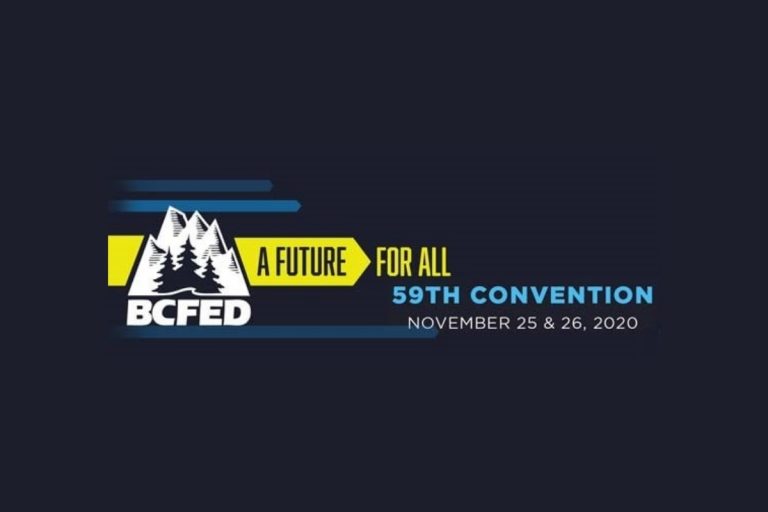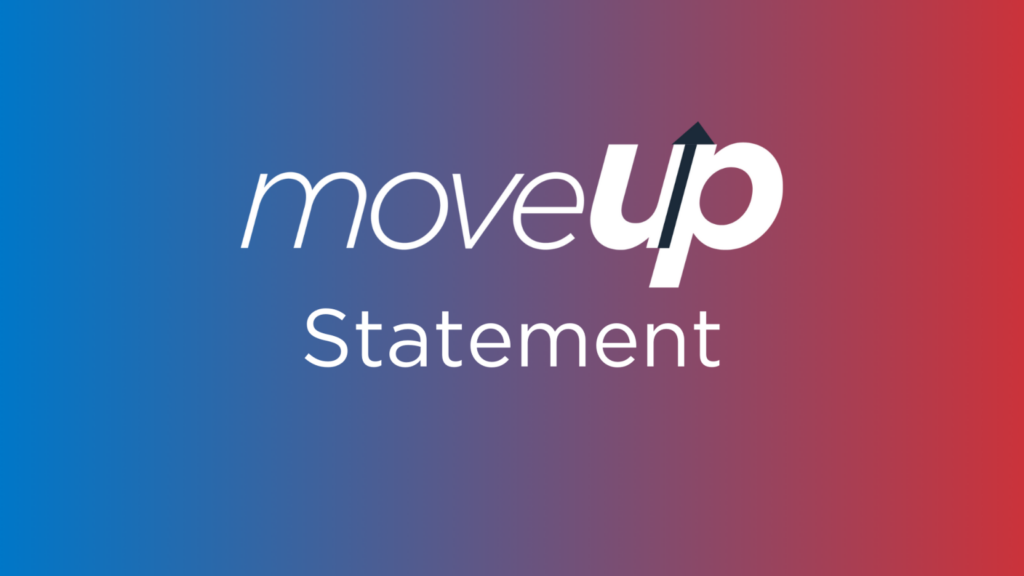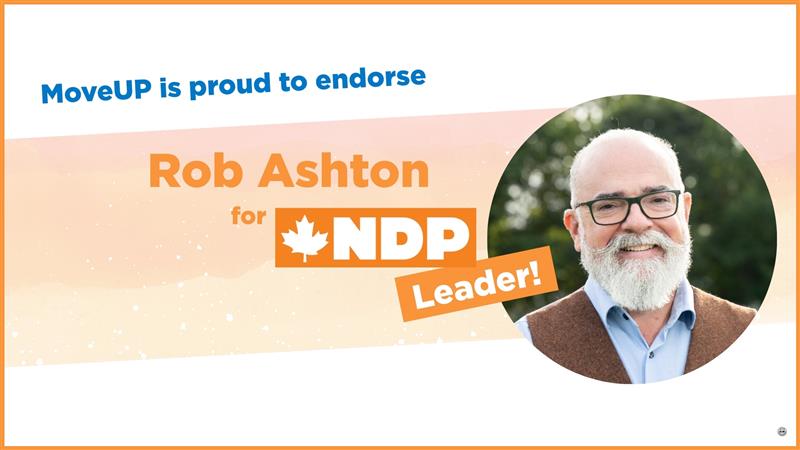The global COVID-19 pandemic has forced organizations around the world to find news ways to deliver programming and events that would previously have involved gathering people in a room or at a venue.
The 59th constitutional convention of the BC Federation of Labour is no exception. Where the annual convention would have taken place at a large venue such as the Vancouver Convention Centre in 2018, this year necessitated a move to an all-virtual event where delegates – including those from MoveUP – virtually beamed in home offices, living rooms, and kitchens from across the province.
Check back for more updates throughout the Convention week. Learn more about the BCFED Convention at convention.bcfed.ca.
Day 2 – Thursday, November 26
Day 2 – Thursday, November 26
The presentation of the Joy Langan Award kicked off the second day of business at the 2020 Convention. Created in 2009 and named after the late labour activist and former Vice-President and President of the BC NDP, and ND MP for the federal riding of Mission-Coquitlam, this year’s award was presented to Sparrow Taranov, and ILWU member.
In her acceptance speech, Sparrow talked about her proud background working in trades – as a millwright, a heavy machine operator, a commercial fisherman – and the importance of including more women in trades. She spoke about wanting to encourage other women to know they can do anything they want to do and can do it well.
The featured speaker of the second day of Convention was the leader of Canada’s NDP, Jagmeet Singh.
Jagmeet thanked all the delegates for their work in fighting for a better life and community, as well as thanked everybody on their mobilization to help successful re-elect a BC NDP government in the recent provincial election. He talked about the achievements of the BC NDP particularly in the area of childcare, as well as the BC NDP’s help in pushing for federal paid sick leave.
He also talked about how the federal NDP have been fighting for improvements to the benefits for people affected by the pandemic, and for those left behind by the federal government including seniors, people with disabilities, and students. He noted that the fight is not over and that more people still need help.
The pandemic not hit everybody in the same way. Those at the top have seen massive increases in profit, while everyday families and small businesses are struggling. Recovery has to be on fixing this problem. When times are tough, Conservatives put the burden on working people and that, says Jagmeet, cannot be allowed to happen. Taxing wealth and excess profits will allow us to build jobs, a resilient economy, and tackle the climate crisis.
The Executive Council report, outlining the work of the BCFED over the last two years, was passed. Many delegates spoke in support for the report, raising specifically the work done in the areas of climate change, Indigenous relations, union organizing and union education. The full report can be found on the BCFED Convention Book.
The resolutions debated on the second and final day of Convention were as follows.
Resolution 181 calling on the BCFED to support the calls by the Professional Employees Association and other unions for to invest in post-secondary education as a critical step towards a just economic recovery in B.C., was carried.
MoveUP Vice-President Christy Slusarenko spoke about post-secondary being a pathway to good jobs and how post-secondary institutions have played a vital role in growing our economy. She talked about building back the post-secondary institutions to be even better than before and how strong investment can not only revitalize the sector and bring back jobs, but can stimulate other sectors that support it as well.
Resolution 203, submitted by the Vancouver & District Labour Council, calling on the BCFED to support MoveUP’s Driving Public campaign and the efforts of the B.C. government to fix ICBC, and to speak out against allowing private insurance companies to enter the basic car insurance market, was carried.
MoveUP President David Black made comparable to the condo insurance crisis and explained how the ‘competition will fix everything’ solution is fallacy, and how privatization of a public service has always led to higher costs and worst service.
MoveUP’s Greg Cordick spoke about how the private car insurance industry and claim their industry is in crisis, and the only solutions they have been able to offer is to drastically erode coverage and discriminate against gender, age, marital status and postal code.
Vancouver & District Labour Council President Stephen Von Sychowski spoke about how the union members at ICBC deserve the support of the labour movement.
MoveUP Vice-President Annette Toth also spoke about the dedication of the workers at ICBC and how their only desire is to take care of drivers, passengers, cyclists and passengers and not being pawns in a political game.
Resolution 204 calling on the BCFED to endorse Access BC and its call for free prescription contraceptives was carried.
Resolution 208 calling on the BCFED to endorse the #Vote16BC campaign to reduce the voting age in B.C. to 16 was carried.
MoveUP Executive Board member Milena Kollay talked about how our youth today are some of the strongest advocates for critical issues such as housing affordability, supporting the homeless, and the climate emergency, and yet they are being silenced at the ballot box because of an antiquated notion that youth equates to lack of knowledge. She noted that if we want to truly embrace progress and change for the better, we cannot stifle these voices.
MoveUP’s Kelly Cammack spoke about her own experiences being involved in political activism at the age of 12 and the painful wait it was to be able to vote. She noted lowering the voting age has the effect of supporting education and engagement of youth.
Resolution 162 calling on the BCFED to urge the provincial government to bring contracted-out hospital support workers back under the control of health authorities without delay was carried.
Resolution 177 calling on the BCFED to call on all employers to pay a COVID-19 pandemic premium to all frontline, essential and critical workers while we are under a state of emergency due to COVID-19 in B.C. was carried.
Emergency Resolution 2 calling on the BCFED to work with affiliates and Indigenous educators to educate union members and the general public in B.C. on the harmful history of the residential school in Canada was carried. This emergency resolution is in direct response to the video posted of a school activity where students were asked to write down “5 positive things about residential schools.”
Emergency Resolution 2 solicited numerous calls from delegates across the province who spoke passionately condemning this horrific act.
All motion to have all remaining resolutions not debated at the Convention to be referred back to the Executive Council was carried.
The final business of the Convention was elections.
Laird Cronk was acclaimed as president of the BCFED for a new two-year term.
Sussanne Skidmore was acclaimed as secretary-treasurer of the BCFED for a new two-year term.
For more information on the elections for executive council members for labour council, and trustee elections, pleased refer to the BCFED.
Gunter elected
MoveUP congratulates our Executive Board member Gunter Seifert on being successfully elected as the equity rep for the BCFED’s 2SLGBTQIA+ caucus. The vote took place during the 2SLGBTQIA+ Workers’ Caucus held on Wednesday.
Day 1 – Wednesday, November 25
The 2020 BCFED Convention officially kicked off on Wednesday, virtually for participants but staged in-person at the unionized Westin Bayshore hotel located in Vancouver on the unceded territory of the xʷməθkʷəy̓əm (Musqueam), Skwxwú7mesh Úxwumixw (Squamish), and Tsleil-Waututh First Nations.
Alec Dan, cultural representative for the xʷməθkʷəy̓əm (Musqueam) First Nation, provided the Indigenous Welcome with a recorded segment as part of the opening festivities. He shared some brief stories about how his people traditionally welcome visitors and their cultural practices, and then performed a welcome song in hən̓q̓əmin̓əm̓ language with the words meaning “welcome respected ones, welcome loved ones.”
In his President’s Address, Laird Cronk reflected back on the last two years talking about the work around making labour code changes, reversing 16 years of assault from the BC Liberals to organizing, as well as the solidarity shown by the labour movement naming the Steelworkers strike and hotel strikes in particular.
He noted that while it may be tempting to take a victory lap following the election of a labour-supportive provincial government, we don’t want to look back in four years and think about the missed opportunities. COVID-19 has exposed deep, painful gaps in our society and this is our chance to close those gaps and create a future for all.
In the Secretary-Treasurer’s report, Sussanne Skidmore spoke about the power of teamwork around the finance area, and some of the work of the BCFED managed to engage in including advocating for domestic violence leave, human rights, the UN Declaration on the Rights of Indigenous Peoples, breaking down the barriers to entry for women, working with the Ending Violence Association of B.C. on Be More Than A Bystander, and with the United Way on the Period Promise campaign.
The key item as part of the report was to call on a vote on the BCFED Building Sale Proposition, noting that the BCFED’s head office location on Joyce St. has become an inflexible space with no room to grow. MoveUP President David Black spoke in support of the sale, which passed with 94 per cent support.
The Audited Financial Report was also passed.
B.C. Premier John Horgan, one month and a day removed from the provincial election where he became the first-ever sitting BC NDP Premier to win re-election, was the featured speaker on the opening day of the 2020 Convention.
The Premier spoke about the new makeup of the Legislature which will feature 57 BC NDP members, thanks to the enormous help of those attending this Convention, noting the caucus is more reflective of British Columbia with 29 women and filled with people of diverse backgrounds including cultural and ethnic backgrounds, Indigenous peoples, People of Colour, and LGBTQ2S+ members.
He spoke about the work the BC NDP government has done to date including lifting minimum wage, amending the labour code and addressing employment standards issues, indicating how this agenda is fundamental for the BCFED but for the BC NDP as well. He closed his speech asking delegates to be mindful on what we can do as individuals to lift up the common good, posing the question “what can we do to make sure lives are better tomorrow than they were today?”
Each of the BCFED Committees spoke on their report. The full reports can be found in the BCFED Convention Book.
Several MoveUP delegates spoke in support of the various reports.
MoveUP Executive Board member Gunter Seifert spoke in support of the Human Rights report, noting particularly the section on supporting migrant workers.
MoveUP Secretary-Treasurer Lori Mayhew spoke in support of the Political Action report, reminding delegates the work of the committee does not just end with the election of a labour-friendly provincial government and the importance of not only holding this government accountable, but to be prepared for a federal election, municipal by-elections, and full municipal elections in 2022. She closed by urging delegates to get involved in their own union’s political action committees.
MoveUP Vice-President, Utilities Rysa Kronebusch spoke in support of the Women and Gender Rights report, stating how proud she was for the committee to take a stand on the decriminalization of sex work, and to support sex work as work. She also asked labour affiliates to publicly come out and take a stand in support of sex work and the need to ensure sex workers are protected as other workers are.
MoveUP Executive Board member Milena Kollay, who chairs the BCFED Young Workers Committee, spoke in support of the Young Workers report thanking the committee members, noting the work they have done in the last two years highlighting the Grant de Patie plaque unveiling. She also called on labour leaders to give young workers the opportunities to get involved calling it crucial for the continuation of the labour movement.
With the day’s schedule proceeding ahead of schedule, there was also an opportunity to begin the debate on resolutions which had been previously scheduled to begin on Thursday. Resolutions can be found in the BCFED Convention Book beginning on page 116.
Resolution 182 calling on the BCFED to urge the B.C. government to continue its safe supply program, and work with the solicitor general to decriminalize personal possession of drugs, and with the Canadian Labour Congress press the federal government to do the same, was carried.
MoveUP’s Gunter Seifert spoke in support of the resolution, talking about how many of us know someone who is affected or may even be affected ourselves. He noted the crisis isn’t just about the drugs, but about the stigma, and that we can’t help people until we give them a safe space to get the help they need.
A motion to refer the resolution back to the committee to define the amount and type of drugs to decriminalize was defeated.
Resolution 201, submitted by MoveUP, calling on the BCFED to lobby the Workers Compensation Board (WCB) to expand presumptive coverage for post-traumatic stress disorder (PTSD) resulting from the impact of COVID-19 on all workers, and continuing to support the existing working group of advocates so they can continue to lobby the government, opposition and WCB, was carried.
MoveUP’s Kelly Cammack spoke in support of the resolution, sharing a personal story of her brother-in-law – a mechanic – who suffered PTSD and urged that we cannot abandon those in our society even if they aren’t classified as “front-line” workers.
MoveUP’s Vivian Ho spoke in support of the resolution, sharing her thoughts as a sufferer of PTSD. She talked about the stress of people going through COVID-19 not just for those who have lost jobs, but for those who have lost neighbours, friends, and families, and that we have a responsibility to take care of them as workers.
MoveUP’s Natalie Hoedel spoke in support of the resolution, talking about how it’s not just health workers or first responders who are being put into at-risk situations during COVID-19, naming grocery store workers, restaurant workers, and credit union workers among others who have had to face violent, anti-mask extremists as an example. She urged that we cannot discriminate on the basis of industry when it comes to the effects of COVID-19 on someone’s physical and mental health.
Resolution 174A calling on the BCFED to lobby the B.C. government to address housing affordability, and endorsing the Vancouver Tenants Union petition NoRentDebts.ca, was carried.
MoveUP’s Mario Lopez spoke in support of the resolution, indicating that while the freeze on rents and evictions have been welcome, we cannot afford to delay the inevitable by replacing one terrible issue that threatens lives with another by putting people into a situation where they are kicked out of their homes after the pandemic is over.
MoveUP’s Gagan Gill also spoke in support of the resolution, talking about the importance of putting people into an equal, if not better, position once we come out of the pandemic. She noted that people cannot live in fear that once the pandemic passes, they will be faced with potentially astronomical rent increases or the possibility of eviction while they are trying to rebuild their lives.
Human Rights Forum – Sunday, November 22
While the main business of the Convention gets underway on Wednesday, Sunday morning featured the Human Rights Forum which was open to any union members regardless of whether they are convention delegates or not. Roughly 200 people participated in the forum virtually.
BCFED President Laird Cronk provided some opening remarks, talking about how COVID-19 has shone the light on gaps and inequities and heightened our awareness of these issues, and the desire he has of finding solutions that practically address human rights issues and inequity issues.
Laird spoke specifically about how, with a BC NDP government in place, among the key priorities for B.C.’s labour movement will include making sure the Human Rights Commission is funded and doing right things for workers, ensuring we are the primary stakeholder in the review of the Multiculturalism Act and in looking at anti-racism laws, and ensure that new laws are consistent with the UN Declaration on the Rights of Indigenous Peoples (UNDRIP).
Chastity Davis-Alphonse, a consultant who works with 100 First Nations communities in B.C., spoke on eradicating systemic racism and having a gendered lens from an Indigenous perspective. She indicated that UNDRIP is a framework for reconciliation and demystifies the path forward.
In addition to UNDRIP, organizations can also use 94 calls to action from the Truth and Reconciliation Commission of Canada, the 231 Calls for Justice from the Murdered and Missing Indigenous Women and Girls (MMIWG) Inquiry, and the Tsilhqot’in Nation v. British Columbia decision from the Supreme Court of Canada as road maps.
Markiel Simpson, a community advocate from the BC Community Alliance who has advocated for Canadian black history to be taught in K-12 school curriculum of inclusion of Indigenous, Black, and People of Colour (IBPOC) in areas that are dominated by CIS gendered white people in positions of power, spoke about his own experiences in trying to explore how to eradicate systemic racism within institutions and structures of organized labour.
He talked about how the first step is to recognize that racism exists at every level and the need to commit to a type of change where those with white privilege have to take on and share the burden of vulnerability that IBPOC are faced with when they speak out.
Quanah Style, Canada’s most infamous trans artist, spoke about her own transition experience and why trans individuals are some of the strongest people and a valuable asset for organizations because they know who they are and they don’t back down from a good fight.
She explained that integrated trans workers are good for business because they can attract and retain people that are the most qualified, productive, innovative, and creative.
Bára Hladik, Human Rights Officer at Disabled Network Canada, spoke about ableism and the need to have conversations that we don’t normally create space for in the labour structure. She talked about how investing in disabled people is an investment that pays off hugely because they are hard-working and innovative people, and they know exactly what they need.
Proper follow-up and accountability with disabled individuals are critical, and their input needs to be received without simply being told ‘it’s not possible.’ She used the current pandemic as an example suggesting how people, particularly in higher-paying jobs, were told in the past that working remotely was not possible but yet suddenly became so once the pandemic hit.
Chairs of each of the BCFED Representative caucuses, including MoveUP’s Gunter Seifert on behalf of the 2SLGBTQIA+ caucus, had an opportunity to speak on what they were most proud of from the work their caucus did over the past couple of years, what barriers to inclusion they have identified in the labour movement, as well as what they wanted participants in the Forum to take way.
A full report from each caucus can be found starting on page 52 of the BCFED Convention Book.
Among the takeaways mentioned included more education and increase awareness, recognizing privilege, bringing together groups of representatives and critical-minded individuals to look at policy and ask the question if it’s working.
Chuck Ejeckam, Director or Research and Policy at the BCFED, also reviewed the resolutions in priority order coming from the BCFED Human Rights Standing Committee which all came with a ‘support’ recommendation from the committee. Among those resolutions are several submitted (or co-submitted) by MoveUP.
All resolutions, sorted by committee, can be found starting on page 116 of the BCFED Convention Book, or in numerical order here.



